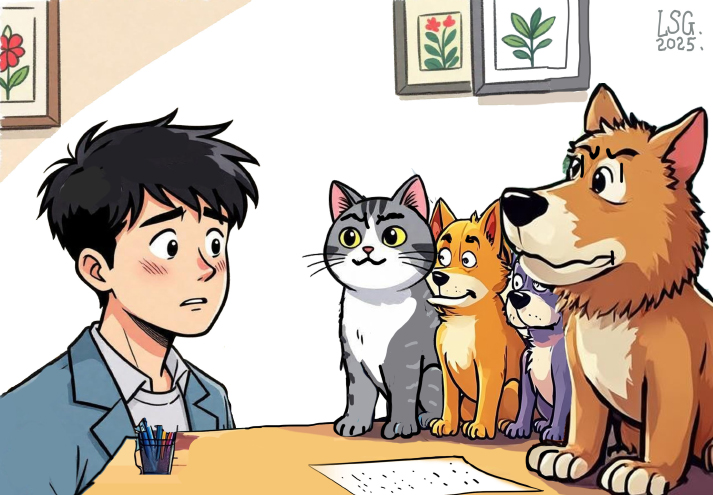| China |
| Furry futures: Can China's new pet science program match industry hype? | |
|
|
 (CARTOON BY LI SHIGONG)
China Agricultural University (CAU) has launched the country's first-ever undergraduate program in companion animal science—a direct response to China's exploding pet industry. The four-year bachelor's degree in agricultural science (companion animals) will cover specialized courses like breed genetics, pet nutrition, reproductive physiology and animal welfare. Graduates will be primed for careers as pet nutritionists, breeding specialists or animal welfare officers—roles in high demand as China's pet ownership surges. But can enthusiasm translate into expertise? While students may be drawn by the novelty, the program's long-term success hinges on rigorous academics and industry partnerships. "This isn't just about cuddling cats," warned one professor on Chinese social media. "It's about building a scientific backbone for a booming sector." With pets gaining popularity in urban Chinese households, the stakes are high. Will this program groom the next generation of pet tech leaders—or become a flash in the pan? The answer lies in the classroom. Kong Deqi (Gmw.cn): China's pet consumption market exceeded 300 billion yuan ($42 billion) in 2024, and the country boasts over 500,000 registered pet-related businesses. Despite this booming market, there are fewer than 70,000 licensed veterinarians nationally, and a severe shortage of professionals in niche areas like pet nutrition and behavior training persists. This makes the introduction of an undergraduate pet program especially relevant now. Some people question whether washing and grooming pets should be introduced as a college program, given that such things are easy to do. These views demonstrate a lack of understanding of modern pet science. The curriculum of this program encompasses a wide range of subjects, including nutrition and genetics. Systematic education will cultivate multifaceted professionals grounded in strong theoretical knowledge and practical abilities. Career paths for graduates of this major span the entire pet industry, from production to services. They can also contribute to shaping pet welfare policies within government agencies. Furthermore, the program offers the opportunity to conduct in-depth research on ethical considerations such as pet welfare, rights and behavior, which helps provide a theoretical basis for policies and laws. Yu Yang (Rednet.cn): The demand for pet-related professionals is as real as the risks linked to the pet industry. The rapid expansion of the Chinese pet market is giving birth to a huge industrial chain covering food, medical care, grooming, funeral services and even pet travel photography. The exponential growth of the industry has led to a huge shortfall in veterinarians, nutritionists, behavioral trainers and so on. Service quality varies while fee charges are chaotic. Worse still, the lack of industry standards frequently causes disputes between pet stores and owners. CAU launching its pet program at this moment in time aims to fill the gap. Behind the prosperity of the pet industry lie risks. This industry heavily relies on consumer willingness, while high-end, non-essential pet-related consumption is easily influenced by market fluctuations. Pet hospitals, high-end grooming services and Internet-famous pet stores all face tough competition. More importantly, there is a huge wage gap within this industry. At the pinnacle of the pet care industry, doctors and groomers can earn impressive salaries. However, entry-level positions like pet care and retail staff often receive wages much lower than expected for a "hot industry." When universities launch new programs, they should look beyond the superficial appeal of hot industries and instead focus on building a robust and long-lasting career trajectory for their students. Can the faculty keep pace? Are high-level pet hospitals and well-known companies accessible for graduates seeking internships? Does a graduate's competitiveness lie in their systematic scientific literacy and problem-solving skills, or are they simply distinguished by a bachelor's degree related to pets? BR Copyedited by Elsbeth van Paridon Comments to yanwei@cicgamericas.com |
|
||||||||||||||||||||||||||||
|